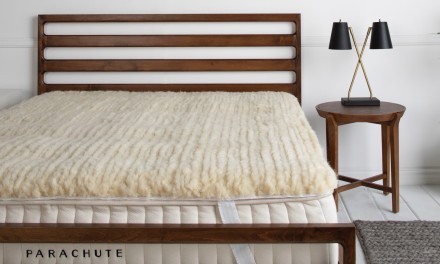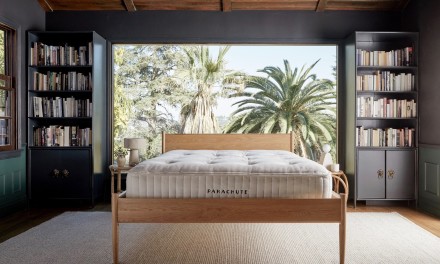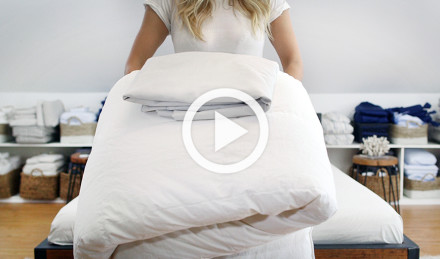If you're on a search for your best shuteye, a high-quality mattress is crucial. Having said that, a few simple tweaks can make your bed all the more comfy. One option is to add a plush layer between your mattress and your fitted sheet.
We're talking about mattress toppers and mattress pads. These products aren't quite bedding, and they're definitely not a replacement for a mattress, so what are they, exactly? And what's the difference between a mattress topper and a mattress pad? Do you need both, just one, or neither? Find answers to these questions and more about mattress pads and toppers below.
Mattress Topper vs. Mattress Pad
Both mattress toppers and mattress pads go on top of your mattress and are designed to make your bed more comfortable. Depending on the type and material, they can also help protect your mattress from stains and prevent wear and tear.
So, what's the difference? A mattress topper can be a few inches thick with the main purpose of adding cushioning and warmth, whereas a mattress pad adds a relatively thin layer of soft padding, but its primary purpose is to protect your mattress. Read on for a detailed breakdown of each.
Mattress Topper vs. Mattress Pad
Both mattress toppers and mattress pads go on top of your mattress and are designed to make your bed more comfortable. Depending on the type and material, they can also help protect your mattress from stains and prevent wear and tear.
So, what's the difference? A mattress topper can be a few inches thick with the main purpose of adding cushioning and warmth, whereas a mattress pad adds a relatively thin layer of soft padding, but its primary purpose is to protect your mattress. Read on for a detailed breakdown of each.
What is a mattress topper?
A mattress topper is typically one to three inches thick and the same length and width as a mattress. You can find options that look like thinner versions of mattresses, as well as fluffy toppers that look more like small comforters.
But what does a mattress topper do, and what is it for? Essentially, it changes the feel of your mattress, making it softer, thicker, warmer, more supportive, fluffy or plush. If your bed is a little too firm or you run cold at night, a mattress topper might be the perfect solution. Whether at college, on an extended work trip, or staying with relatives, it's also ideal for those who want to make their bed comfier while sleeping away from home.
What is a mattress topper?
A mattress topper is typically one to three inches thick and the same length and width as a mattress. You can find options that look like thinner versions of mattresses, as well as fluffy toppers that look more like small comforters.
But what does a mattress topper do, and what is it for? Essentially, it changes the feel of your mattress, making it softer, thicker, warmer, more supportive, fluffy or plush. If your bed is a little too firm or you run cold at night, a mattress topper might be the perfect solution. Whether at college, on an extended work trip, or staying with relatives, it's also ideal for those who want to make their bed comfier while sleeping away from home.
One thing to keep in mind about mattress toppers is that while they can help prevent stains from reaching your mattress, they're not always machine washable. Some are dry clean only, some can be hand-washed and others come with removable covers that can be tossed in the washer.
One thing to keep in mind about mattress toppers is that while they can help prevent stains from reaching your mattress, they're not always machine washable. Some are dry clean only, some can be hand-washed and others come with removable covers that can be tossed in the washer.
Mattress Topper Materials and Types
There are several types of mattress toppers, and as you can imagine, they're not all created equal. If you're looking for a fluffy, soft-as-a-cloud effect, your best bet is down or down alternative. If you want plush insulation and warmth, consider wool. Here's what you should know about these mattress topper materials.
Mattress Topper Materials and Types
There are several types of mattress toppers, and as you can imagine, they're not all created equal. If you're looking for a fluffy, soft-as-a-cloud effect, your best bet is down or down alternative. If you want plush insulation and warmth, consider wool. Here's what you should know about these mattress topper materials.
Down Mattress Topper
For five-star-hotel-level luxury and marshmallow-like softness, a down mattress topper is the way to go. Also known as a featherbed, this type of topper typically consists of a cotton shell filled with the unbeatably soft and fine fibers found on the undercoating of geese and ducks. The material is usually humanely sourced.
Down is naturally insulating yet light and airy. Like down pillows and duvets, featherbeds can be shaken out and fluffed back up when they become flat.
Down Mattress Topper
For five-star-hotel-level luxury and marshmallow-like softness, a down mattress topper is the way to go. Also known as a featherbed, this type of topper typically consists of a cotton shell filled with the unbeatably soft and fine fibers found on the undercoating of geese and ducks. The material is usually humanely sourced.
Down is naturally insulating yet light and airy. Like down pillows and duvets, featherbeds can be shaken out and fluffed back up when they become flat.
Down Alternative Mattress Topper
If you like the feel of down but are allergic to the fill or prefer bedding that isn't sourced from animals, down alternative is an excellent choice. Down alternative mattress toppers are typically filled with ultra-fine, feather-like microfiber and have cotton shells for breathability. With this hypoallergenic option, you'll still enjoy the three-dimensional plushness, softness and warmth of down.
Down Alternative Mattress Topper
If you like the feel of down but are allergic to the fill or prefer bedding that isn't sourced from animals, down alternative is an excellent choice. Down alternative mattress toppers are typically filled with ultra-fine, feather-like microfiber and have cotton shells for breathability. With this hypoallergenic option, you'll still enjoy the three-dimensional plushness, softness and warmth of down.
Wool Mattress Topper
Wool is a soft, dense and naturally insulating material sourced from the coats of sheep. Since fleece regrows exceptionally fast after shearing, it's considered a sustainable material. With shearling on top and cloth backings, wool mattress toppers look kind of like sheepskin rugs. They also often have elastic straps on the corners to ensure they stay in place.
Aside from providing insulation, this type of topper is naturally flame resistant and antimicrobial, meaning it resists bacteria and mold growth. What's more, the material keeps you warm and toasty through the winter and helps wick away moisture in the balmy summertime.
Some wool mattress toppers are made from virgin wool. The unprocessed material retains its natural crimp, making it more supportive and resistant to body impressions.
Wool Mattress Topper
Wool is a soft, dense and naturally insulating material sourced from the coats of sheep. Since fleece regrows exceptionally fast after shearing, it's considered a sustainable material. With shearling on top and cloth backings, wool mattress toppers look kind of like sheepskin rugs. They also often have elastic straps on the corners to ensure they stay in place.
Aside from providing insulation, this type of topper is naturally flame resistant and antimicrobial, meaning it resists bacteria and mold growth. What's more, the material keeps you warm and toasty through the winter and helps wick away moisture in the balmy summertime.
Some wool mattress toppers are made from virgin wool. The unprocessed material retains its natural crimp, making it more supportive and resistant to body impressions.
What type of mattress topper is best for you?
What is the best mattress topper for back pain, hip issues or shoulder pain? And how about side sleepers, stomach sleepers and folks who run hot or cold?
A more supportive option like a wool mattress topper is generally best for people with back, hip and shoulder pain, as it resists compression and cradles your pressure points. The moisture-wicking material can also help keep you cool and dry through the night.
Naturally insulating wool mattress toppers cater to people who run cold as well. However, featherbeds and down alternative toppers are designed for comfy-cozy warmth. And as we mentioned, those looking for a softer, fluffier feel should go for down or down alternative.
What type of mattress topper is best for you?
What is the best mattress topper for back pain, hip issues or shoulder pain? And how about side sleepers, stomach sleepers and folks who run hot or cold?
A more supportive option like a wool mattress topper is generally best for people with back, hip and shoulder pain, as it resists compression and cradles your pressure points. The moisture-wicking material can also help keep you cool and dry through the night.
Naturally insulating wool mattress toppers cater to people who run cold as well. However, featherbeds and down alternative toppers are designed for comfy-cozy warmth. And as we mentioned, those looking for a softer, fluffier feel should go for down or down alternative.
What is a mattress pad?
A mattress pad looks like a thick fitted sheet but with a thin layer of padding. Most are filled with down or down alternative microfiber, though you can find options with wool, cotton, latex and memory foam padding. The padding is covered by quilted fabric (usually cotton), and the sides and corners typically have elastic edges that tuck around your mattress.
Mattress pads are meant to protect your mattress with the added bonus of making it a little more comfortable. Unlike toppers, they're usually machine washable.
What is a mattress pad?
A mattress pad looks like a thick fitted sheet but with a thin layer of padding. Most are filled with down or down alternative microfiber, though you can find options with wool, cotton, latex and memory foam padding. The padding is covered by quilted fabric (usually cotton), and the sides and corners typically have elastic edges that tuck around your mattress.
Mattress pads are meant to protect your mattress with the added bonus of making it a little more comfortable. Unlike toppers, they're usually machine washable.
What type of mattress pad is best for you?
Like other types of down bedding, feather mattress toppers are soft and airy yet cuddly and warm. Natural down and cotton make for a perfectly durable, breathable and lightweight combo.
On the other hand, if you love the fluffiness of down but want a hypoallergenic, feather-free option, consider a down alternative mattress pad. Made from polyester, the microfiber fill effectively mimics the light, floaty appeal of real down.
What type of mattress pad is best for you?
Like other types of down bedding, feather mattress toppers are soft and airy yet cuddly and warm. Natural down and cotton make for a perfectly durable, breathable and lightweight combo.
On the other hand, if you love the fluffiness of down but want a hypoallergenic, feather-free option, consider a down alternative mattress pad. Made from polyester, the microfiber fill effectively mimics the light, floaty appeal of real down.
How to Choose a Mattress Topper or Pad
As with mattresses and bedding, there's no-one-size-fits-all mattress topper or mattress pad. Here are a few things to consider when shopping around.
How to Choose a Mattress Topper or Pad
As with mattresses and bedding, there's no-one-size-fits-all mattress topper or mattress pad. Here are a few things to consider when shopping around.
Thickness
As we mentioned, mattress toppers usually range from one to three inches in height, but you can find thinner and thicker options. If you're looking for ultimate fluffiness and cushioning, the thicker the better. Just bear in mind that you might need a deeper fitted sheet to cover the extra inches, like the ones we carry at Parachute. The thin padding on a mattress pad shouldn't affect how your fitted sheet fits.
Thickness
As we mentioned, mattress toppers usually range from one to three inches in height, but you can find thinner and thicker options. If you're looking for ultimate fluffiness and cushioning, the thicker the better. Just bear in mind that you might need a deeper fitted sheet to cover the extra inches, like the ones we carry at Parachute. The thin padding on a mattress pad shouldn't affect how your fitted sheet fits.
Warmth
Another thing to think about is warmth. Naturally insulating down and wool are generally the warmest options, though high-quality down alternative toppers and pads do a good job of mimicking their warmth. For more on layering check out our styling guide.
Warmth
Another thing to think about is warmth. Naturally insulating down and wool are generally the warmest options, though high-quality down alternative toppers and pads do a good job of mimicking their warmth. For more on layering check out our styling guide.
Support
Mattress pads aren't designed to provide support, and some toppers are more supportive than others. Featherbeds and microfiber-filled toppers are more about fluffiness, whereas dense wool toppers support your pressure points.
Support
Mattress pads aren't designed to provide support, and some toppers are more supportive than others. Featherbeds and microfiber-filled toppers are more about fluffiness, whereas dense wool toppers support your pressure points.
Breathability
When buying a mattress topper or pad, you'll want to look for breathable materials. Since foam and gel tend to trap heat, they aren't ideal for people who run hot or sweat at night. With that said, light and airy down is naturally breathable, and microfiber fill is designed to offer the same level of airflow. Wool is also breathable and cooling, as it absorbs moisture and then evaporates it. Whether you choose down, down alternative or wool, we recommend options with cotton shells, as the lightweight weave promotes airflow.
Breathability
When buying a mattress topper or pad, you'll want to look for breathable materials. Since foam and gel tend to trap heat, they aren't ideal for people who run hot or sweat at night. With that said, light and airy down is naturally breathable, and microfiber fill is designed to offer the same level of airflow. Wool is also breathable and cooling, as it absorbs moisture and then evaporates it. Whether you choose down, down alternative or wool, we recommend options with cotton shells, as the lightweight weave promotes airflow.
Ethically Sourced Materials
When buying a featherbed or a down mattress pad, look for information about how the material is sourced. For instance, Parachute's down supplier is Responsible Down Standard (RDS) certified, ensuring the feathers come from humanely treated geese and ducks.
Ethically Sourced Materials
When buying a featherbed or a down mattress pad, look for information about how the material is sourced. For instance, Parachute's down supplier is Responsible Down Standard (RDS) certified, ensuring the feathers come from humanely treated geese and ducks.
What to Know About Mattress Protectors
People often get toppers and pads confused with mattress protectors. A mattress protector is similar to a mattress pad in that it goes on like a fitted sheet and helps safeguard your mattress from stains and spills.
However, while mattress protectors typically feature a thin quilted layer, they aren't padded. Parachute carries ultra-breathable 100% cotton protectors to go over your mattress and under your fitted sheet.
What to Know About Mattress Protectors
People often get toppers and pads confused with mattress protectors. A mattress protector is similar to a mattress pad in that it goes on like a fitted sheet and helps safeguard your mattress from stains and spills.
However, while mattress protectors typically feature a thin quilted layer, they aren't padded. Parachute carries ultra-breathable 100% cotton protectors to go over your mattress and under your fitted sheet.
Where to Find the Most Comfortable Mattress Pads and Toppers
For next-level comfort and the softest, most luxurious sleeping experience, check out mattress toppers from Parachute. From light and pillowy down to lofty, cloud-like down alternative to dense, supportive and incredibly plush wool, we carry all the best options.
Our featherbeds and microfill toppers are 3 inches thick with baffle-box stitching, a dual-chamber design and 100% cotton shells. Our thick wool mattress topper is made of 100% virgin American wool with a pile height of 1.75 inches.
As for our mattress pads, you can count on super-fluffy fills and breathable protection. Parachute's down and down alternative pads feature double-stitched cotton quilting and continuous elastic hems.
A mattress topper can make your bed comfier, and a pad can help protect it. And yet, they can't make up for a bad mattress. When the time comes to get a new one, Parachute has you covered there too. The Mattress is supportive, comfortable and soft yet firm in all the right places.
Browse our collections today!
Where to Find the Most Comfortable Mattress Pads and Toppers
For next-level comfort and the softest, most luxurious sleeping experience, check out mattress toppers from Parachute. From light and pillowy down to lofty, cloud-like down alternative to dense, supportive and incredibly plush wool, we carry all the best options.
Our featherbeds and microfill toppers are 3 inches thick with baffle-box stitching, a dual-chamber design and 100% cotton shells. Our thick wool mattress topper is made of 100% virgin American wool with a pile height of 1.75 inches.
As for our mattress pads, you can count on super-fluffy fills and breathable protection. Parachute's down and down alternative pads feature double-stitched cotton quilting and continuous elastic hems.
A mattress topper can make your bed comfier, and a pad can help protect it. And yet, they can't make up for a bad mattress. When the time comes to get a new one, Parachute has you covered there too. The Mattress is supportive, comfortable and soft yet firm in all the right places.
Browse our collections today!










